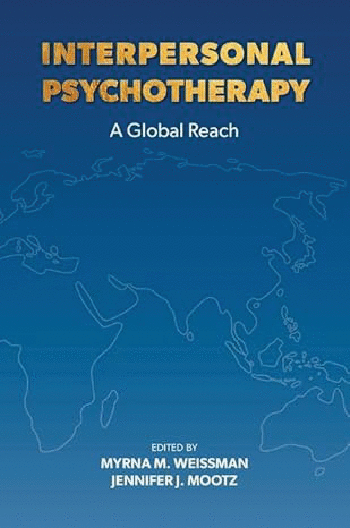edited by Myrna M. Weissman and Jennifer J. Mootz; New York, Oxford University Press, 2024, 552 pages
Interpersonal Psychotherapy: A Global Reach is a groundbreaking volume that offers a comprehensive global perspective on the training, certification, adaptation, and implementation of interpersonal psychotherapy (IPT) across diverse cultural contexts. Edited by Myrna M. Weissman and Jennifer J. Mootz, this book significantly contributes to understanding how IPT can be adapted to meet the needs of various populations worldwide.
The book opens with a historical overview of IPT, followed by an analysis of efficacy studies and a new meta-analysis by Pim Cuijpers and his team. It then delves into the work of the International Society of Interpersonal Psychotherapy and the certification process. The subsequent sections cover a broad range of topics, from training methods in different regions—such as online platforms and specialized programs in Europe, Asia, and the United States—to adaptations of IPT in resource-limited settings, including parts of Africa.
The chapter authors present compelling case reports from across geographic regions—Asia, Europe, the Middle East, Oceania, and South America—demonstrating how IPT has been tailored to fit varied cultural and socioeconomic contexts. Notably, part 10 explores IPT adaptations in the United States for specific populations, including sociocultural groups and conditions such as posttraumatic stress disorder and perinatal depression.
One of the book’s strengths is its demonstration of IPT’s broad applicability. The therapy’s conceptual framework, which identifies major interpersonal dilemmas such as role disputes and grief, remains relevant across cultures. However, the book highlights the importance of cultural sensitivity in addressing these dilemmas effectively. The detailed case studies reveal how cultural contexts influence therapeutic approaches and patient engagement, offering illuminating insights into the practical application of IPT.
The chapters are both engaging and thought provoking, presenting opportunities to rethink and refine current IPT practices. For instance, the book illustrates how cultural contexts shape interpersonal relations and influence the effectiveness of therapeutic techniques. Therapists will find it essential to understand these cultural dynamics to deliver care that is both respectful and effective. For example, although direct communication is often effective in many Western contexts, it may be counterproductive or culturally inappropriate in Eastern settings. This book underscores the need for therapists to adapt their approach on the basis of the patient’s cultural background, ensuring that therapeutic interventions are both respectful and impactful.
In summary, Interpersonal Psychotherapy: A Global Reach offers invaluable insights for IPT practitioners and other mental health professionals. Its detailed exploration of IPT adaptations across diverse cultural contexts provides a deeper understanding of how to tailor therapeutic approaches to better meet the needs of different populations. This book is an essential resource for those committed to enhancing their practice through culturally informed and effective therapy.


